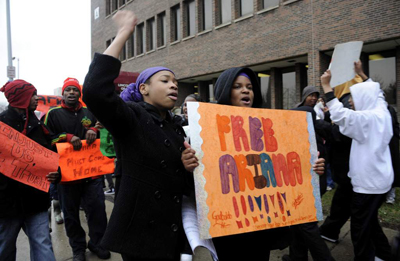By Kelly Patricia O’Meara
April 23, 2013
It has been said that “heroes are ordinary people who make themselves extraordinary.”
Maryanne Godboldo and Allison Folmar are extraordinary women. Their names may not elicit immediate recognition by the masses but it is because of their belief in the right of parents—not the state—to decide whether to medicate a child, that their struggle will protect thousands of children who otherwise would have become victims of deeply flawed State Child Protective Services policies.
It’s been two years since Detroit mother, Maryanne Godboldo, withstood an armed assault by a SWAT team and a tank, assault weapons and helicopter, accouterments worthy of a Die Hard film, determined to kidnap, by force, her then 13-year old daughter, Ariana. The alleged crime? Godboldo refused to give Ariana harmful psychiatric drugs.
The 55-year old Godboldo, after an hours-long standoff, gave herself up to police, was taken into custody and charged with multiple felony counts.Worse, though, was that 13-year old Ariana was taken into state custody while Godboldo’s case worked its way through the court system.
Godboldo’s attorney, Allison Folmar, firmly believed in Godboldo’s parental rights and never wavered in her support. Much to her credit, Folmar has represented Godboldo pro-bono throughout the judicial proceedings and was pleased when, in August of 2011, all charges were dropped against Godboldo.
But that was just the first hurdle. It wasn’t until five weeks later that Ariana was returned to Godboldo, and then only after three Michigan courts had determined that Godboldo’s refusal to drug her child was completely legal.
In fact, from beginning to end of the Godboldo saga, no part of the assault had been legal. Child Protective Services did not have a legal court order nor warrant to forcibly remove Ariana from her home. Rather, a “writ” was issued to CPS with literally a rubber stamp, with no judge actually reviewing the request.

Local Detroit residents protested the unlawful seizure of Maryanne Godboldo’s daughter, with signs saying ‘Free Arianna.’
To make matters worse, in initially agreeing to treat Ariana with the state-recommended Risperidone—an extremely dangerous antipsychotic—Godboldo signed an informed consent document guaranteeing her the right to stop the medication at any time. Despite these assurances and the law behind Godboldo, Child Protective Services moved forward with the assault—a State policy that apparently has been terminated.
Today the Michigan Department of Human Services reports on its website that the reason for Ariana’s removal no longer exists. “Medication – CPS is not responsible for investigating complaints that allege parents are failing or refusing to provide their children with psychotropic medication such as Ritalin.”
“The Michigan DHS website is interesting,” says Folmar, “because this is what Maryanne’s case is all about. The CPS policy at the time of the assault was different. I can’t help but think that the change is a direct result of this litigation.”
It’s anyone’s guess why Michigan DHS has decided to change its CPS investigation policy, but there is enough startling information about the drugging of children within state programs that one can be sure it is none too soon.
For example, according to a 2012 Government Accountability Office (GAO) report reviewing psychotropic drug prescriptions covered by Medicaid in 2008 for Florida, Maryland, Massachusetts, Michigan, Oregon and Texas, “foster children in each of the five states (Maryland’s data was unreliable) were prescribed psychotropic drugs at higher rates than were non-foster children.”
The GAO report further revealed that “foster children in the five states were prescribed psychotropic drugs at rates 2.7 to 4.5 times higher than were non-foster children in Medicaid in 2008 (most recent data) and the rates were higher in each of the age ranges reviewed.”
Additionally, according to the GAO report, children in foster care across the five states were prescribed five or more psychotropic drugs at higher rates than non-foster care children, exceeded the maximum doses at higher rates than non-foster care children and were given to infants (under 1 year old) at higher rates than non-foster care children.
Given the above data, is it any wonder that Godboldo stood up for her daughter? Unfortunately, though, despite having all charges dismissed against her, the Wayne County prosecutor still is looking to take Godboldo to trial.
“They are continuing to try and put Maryanne in prison,” says Folmar, “for standing up and refusing to let police into her home. We won at the district level and the judge saw the case for what it is… the illegal conduct of police. They had no probable cause and no valid order to enter Maryanne’s home.”
“We need help putting the word out,” says Folmar, “that this case affects everyone. Forcing medication down parents throats and literally the throats of children cannot be tolerated. This is about parents’ rights to be able to protect their children.”
“I think,” says Folmar, “that the continued interest in Maryanne is about them sending a message. They are scrambling for some justification of their wrong-doing.”
“In the end,” says Folmar, “it is a basic human right for parents to choose if they want to medicate their children. When the state steps in and says ‘hey, mom and dad, we know what’s better for your child,’ that’s wrong. There are too many of these cases where the state believes it knows more than the parents. It isn’t good for the kids, it isn’t good for the parents and it is ripping families apart.”
“I’m happy,” says Folmar, “to represent someone like Maryanne. She stood up and said ‘no, I refuse to harm my child.'” With respect to CPS and its heavy hand with medication, “It boggles the mind,” says Folmar, “that they are putting kids on medication that they don’t need and is harmful. Maryanne did the right thing to protect her child.” “How could anyone not support that,” asks Folmar. “Whatever it takes,” says Folmar, “we’ll see this through.”
—
Kelly Patricia O’Meara is an award winning investigative reporter for the Washington Times, Insight Magazine, penning dozens of articles exposing the fraud of psychiatric diagnosis and the dangers of the psychiatric drugs – including her ground-breaking 1999 cover story, Guns & Doses, exposing the link between psychiatric drugs and acts of senseless violence. She is also the author of the highly acclaimed book, Psyched Out: How Psychiatry Sells Mental Illness and Pushes Pills that Kill. Prior to working as an investigative journalist, O’Meara spent sixteen years on Capitol Hill as a congressional staffer to four Members of Congress. She holds a B.S. in Political Science from the University of Maryland.




SHARE YOUR STORY/COMMENT